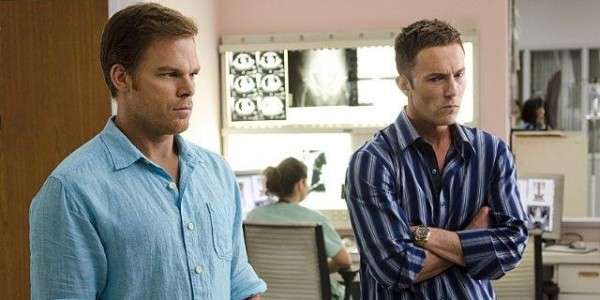Well, that's underwhelming. If I had to pick one word to sum up my feelings about the conclusion of the series it would be ambivalence. While I enjoyed the first half of the season a considerable amount, the later episodes were riddled with cloudy character motivation and less than perfect narrative developments. As the season progressed, the writers’ machinations to get some characters from point A to point B became all too obvious and the story suffered for them. Contrivances ruled the narrative and the characters lost their agency. It is mainly because of this mishandling of the characters that the final episode lacks any kind of emotional depth, despite the compelling performances by most of the actors (particularly Jennifer Carpenter). As much as I have grown to care for Dexter and Debra, it has become difficult to feel anything for them because their situation felt incredibly forced. Consequently moments that were designed to provide poignancy and emotion feel just empty. Debra’s death has been telegraphed for a while, especially as her life started to take a positive turn; she was just too happy to survive. So we spend the entire episode just waiting for Debra to die, because it is going to happen, and when it does, and Quinn cries for her, it doesn’t do anything emotionally engaging because we knew it was coming, (plus Quinn is the worst). Especially when her death is basically a device used by the writers to serve as a catalyst for Dexter’s eventual actions. The writers clearly had an end point for Dexter, which is fine, but they don't execute it in a way that feels natural. Debra needed to die in order for Dexter to realize what a cancer he is people’s lives and then later fake his death and separate himself from Hannah and Harrison. The best thing he can do for his loved ones is to be away from them. I wish the writers had given this concept more time to breathe in the season. They could have introduced this in earlier episodes; there was definitely material the writers could have sacrificed in order to build a more sound emotional journey for Dexter. Early in the season Dexter struggled with his role in Debra’s breakdown but that storyline was resolved too quickly to really appreciate the weight of Debra’s turmoil. And while Dexter gained some self-awareness about his impact in her life, it wasn’t enough for him to do something drastic. Hannah quickly came into the picture and his infatuation with her dictated much of his actions for the rest of the season. So while he was planning a life with Hannah, the writers just haphazardly threw together a "happy" mini-arc for Debra just so that it could be destroyed by the finale, deeming her entire season arc rather meaningless and in total service to Dexter’s story. And while, yes, this is Dexter’s story and all characters serve to tell his narrative, Debra ends up getting the shaft. But if the writers had killed off Debra in at least the penultimate episode and left some room for the death to resound and resonate, the following arc could have had more emotional impact.
The writers clearly had an end point for Dexter, which is fine, but they don't execute it in a way that feels natural. Debra needed to die in order for Dexter to realize what a cancer he is people’s lives and then later fake his death and separate himself from Hannah and Harrison. The best thing he can do for his loved ones is to be away from them. I wish the writers had given this concept more time to breathe in the season. They could have introduced this in earlier episodes; there was definitely material the writers could have sacrificed in order to build a more sound emotional journey for Dexter. Early in the season Dexter struggled with his role in Debra’s breakdown but that storyline was resolved too quickly to really appreciate the weight of Debra’s turmoil. And while Dexter gained some self-awareness about his impact in her life, it wasn’t enough for him to do something drastic. Hannah quickly came into the picture and his infatuation with her dictated much of his actions for the rest of the season. So while he was planning a life with Hannah, the writers just haphazardly threw together a "happy" mini-arc for Debra just so that it could be destroyed by the finale, deeming her entire season arc rather meaningless and in total service to Dexter’s story. And while, yes, this is Dexter’s story and all characters serve to tell his narrative, Debra ends up getting the shaft. But if the writers had killed off Debra in at least the penultimate episode and left some room for the death to resound and resonate, the following arc could have had more emotional impact.
I appreciate how poignant it is to have Dexter essentially killing Debra (even though she was pretty much brain dead already). How this action, which he has done to so many horrible, despicable people in the past, is being subverted, transformed into an act of mercy for the only person who has been a constant in his life. It is quite brilliant, turning what we have seen him do countless times, something that came from a place of anger and turmoil within Dexter, into an act of love. Now that he is transformed, no longer needing to kill because of an inherent drive, he has to go back to his ways for this final act of kindness for his sister, whom he has protected all her life. Yet, even with this poetic and profound feat, which is for all intents and purposes absolutely heartbreaking, for whatever reason it doesn't hit the emotional high for which its aiming. Maybe it was because, for us, Debra is already dead, and this is only the death of her physical body, but her mind is already gone. The performance by Michael C. Hall is adequate, understated but emotional; if he broke down sobbing or something it would be too much. By then Dexter has already decided to leave everything behind and is resigned to his decision, so it makes sense that he would be a little hardened. As he rode into the heart of the storm it seems an appropriate ending to his story, not necessarily shocking or revelatory or unprecedented, but okay.
Finally there is the reveal that Dexter has faked his death and is living a quiet existence working in a lumberyard, which is, again, okay. It is a tiny surprise, just because the suicide by hurricane ending seemed plausible, even if underwhelming. This second ending doesn’t change much, as Dexter is still effectively dead, but it doesn’t move me in any way. Was I hoping for Deter to live or die by the end of the series? Honestly, I didn’t care much as long as the story was engaging. Above anything, in a series finale, one hopes to be affected emotionally, intellectually, etc. The work should cause a reaction, good or bad. The memorable series ends are those that cause outrage and wild speculation (The Sopranos), ones that polarize the audience (Lost), or that are emotionally impactful and/or give closure (Six Feet Under). Ideally a finale provides a memorable conclusion for the characters we have grown to love and care for. Dexter’s last episode is disappointing because, though it does provide appropriate closure, it leaves us with nothing else to hang onto. It feels rushed and lazy and leaves absolutely no emotional or even narrative impact. It just plops.
Random Thoughts
-- Also, what's up with Saxon/Daniel Vogel’s actions? They make absolutely no sense whatsoever. Why would he want to go back and finish the job with Debra? Just to cover his tracks? He already knows that there are people after him; he had previously shown himself as a person that was all about survival and self-preservation. Going to the hospital is completely against that. With the hurricane hoopla it's the perfect time to leave the city unnoticed. Instead, he behaves recklessly and gets himself caught for no reason. The only reason for his actions is that the writers needed a way for Dexter to get near him, so they contrived a way for him to get arrested.
-- I’m fine with nobody in Miami Metro finding out Dexter’s true identity, but boy, does Batista come out as an inept Detective or Captain, or whatever he is. There was natural suspicion and doubt as he and Quinn talked to Dexter about the Daniel Vogel pen incident, which I thought would be expanded into Batista remembering all that LaGuerta told him and putting two and two together, but no. There is a scenario in my head that Batista does suspect Dexter of being a serial killer and probably thinks so, but keeps it to himself because Dex is his friend.
-- Glad it isn't a hokey fairy tale happy ending… no riding into the sunset with Hannah, which would have been horrible.
-- Airing opposite Breaking Bad’s final season did not do the Showtime drama any favors. Yes, they are entirely different programs, but when you see the way Breaking Bad treats its characters and how well the writers on that show create such an amazing, character-driven story, we see how underserved most characters are on Dexter.
-- All this time spent with Masuka and his kid and absolutely no payoff, sigh. This show sometimes. At least Quinn gets to grow up a little bit.
-- Despite my feelings about how the series concludes (this is my initial reaction, which could of course change with time or further review of the work) it doesn’t take anything away from the fantastic first couple seasons of the show (particularly the first two seasons which were close to perfect). It would be interesting to go back and rewatch them knowing how it will all end for the characters and see if it takes away from the fun.